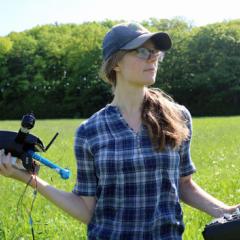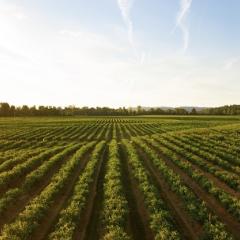About Lindsay's Work
Lindsay Barbieri focuses on problem-solving at the interface of agriculture, environment, and technology — from the field to the global scale. Barbieri works to deepen climate change mitigation understanding within agroecosystems, exploring the use of new and emerging information technologies to better inform and enable sustainable agricultural practices.
Often in the field, Barbieri talks with farmers and collects both biophysical (soil, water, vegetation) and remotely sensed (imagery and atmospheric) information to support agricultural resilience while reducing negative environmental impacts. Off the field, she engages in a variety of data synthesis and analysis endeavors, and collaborates widely to examine opportunities and challenges in the use of information technologies, such as remotely piloted aerial systems (drones), for broader socio-environmental systems research and resource governance. Drawn by the pressing need for sustaining our planetary system in a socially and environmentally just manner, she draws on her knowledge of ecological economics to complement her climate change mitigation research by critically addressing the substantive challenges and adverse consequences that can arise from leveraging technology and development logics to support sustainable futures.
Barbieri earned her PhD in Natural Resources with a certificate in Ecological Economics at the University of Vermont. Prior to becoming a graduate student in the Rubenstein School of Environment and Natural Resources, Barbieri was a professional circus artist and worked on a small dairy farm — completing the FIELD program for small practicing farmers at Washington State University. She earned her BA at Hampshire College in 2010 by analyzing satellite images of Mars in search of geomorphological signatures of climate change, and she still presents astronomy shows at the Charles Hayden Planetarium at the Boston Museum of Science.

